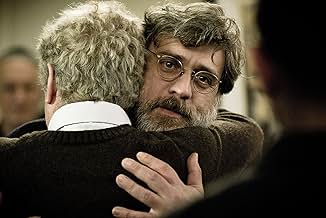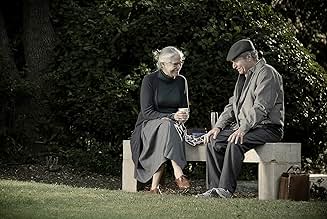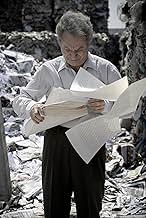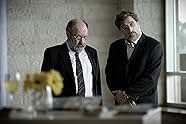Eliezer and Uriel Shkolnik are father and son as well as rival professors in Talmudic Studies. When both men learn that Eliezer will be lauded for his work, their complicated relationship re... Read allEliezer and Uriel Shkolnik are father and son as well as rival professors in Talmudic Studies. When both men learn that Eliezer will be lauded for his work, their complicated relationship reaches a new peak.Eliezer and Uriel Shkolnik are father and son as well as rival professors in Talmudic Studies. When both men learn that Eliezer will be lauded for his work, their complicated relationship reaches a new peak.
- Nominated for 1 Oscar
- 14 wins & 9 nominations total
- Eliezer Shkolnik
- (as Shlomo Bar Aba)
- Yehudit Shkolnik
- (as Alisa Rosen)
- Dikla Shkolnik
- (as Alma Zak)
- Committee Member
- (as Shmulik Shilo)
- Committee Member
- (as Albert Illouz)
- TV Host
- (as Jacky Levy)
- Director
- Writer
- All cast & crew
- Production, box office & more at IMDbPro
Featured reviews
Most parents wish for true happiness for their children. If the professional success of their offspring far exceeds their own ... it is a reason to swell with parental pride. But what happens when father and son choose similar paths? What happens when animosity builds as the father's life work (30 years of research) is deemed unnecessary and irrelevant? What happens when the son becomes publicly revered and adored for his populist writing? Well, in the case of father Eliezer (Shlomo Bar-Aba) and son Uriel (Lior Ashkenazi), we get strained relations and a thesis on the pitfalls of pride and ego.
All of that is sufficiently fascinating for a story, but here we get an even more severe test of human nature. The father is erroneously informed that he has won the prestigious Israel Award, providing vindication and meaning to his work and well, his being. See, the award was supposed to go to the other Professor Shkolnik ... yes, his son. This much is shown in the trailer, but the true guts of this story is what happens after this mistake.
There are a few tremendous scenes in the film, but two really jumped out for me. In an early scene, the son is receiving yet another reward and he is attempting to provide some credit for his father's inspiration. However, the words seem to add credence to the irrelevancy instead. The best part? The camera never leaves the face of the father and he sits quietly listening in immeasurable pain. The other scene takes place in a beyond cramped meeting room for the Award committee to discuss the mistake with Uriel. The manner it is filmed and the choreography more than make up for the fact that the group of brilliant people never thought to find a more suitable meeting place.
The score of the film is one that I would appreciate more without having the film playing. The music is wonderful, but often distracting to the moment. It is interesting to note how it changes along with the posture and walking pace of Eliezer after he is informed of his award. One need not be an academic researcher or writer to understand the damaged relationship between father and son ... and how it has impacted wives, mothers and sons. That's a story that is painful in any language.
It's simply an enjoyable and light little movie, that doesn't ever get too heavy handed, even though it could had easily gone that way. And I thank the movie for that but at the same time it's also giving too little in return.
The movie is taking a more comedy approach to its buildup but with as a problem that there isn't really any true comedy in this movie. It sort of reminded me of a Wes Anderson movie. They are supposed to be comical movies, without anything comical ever happening in it really. It's just not my favorite style of film-making but I know I'm probably a minority on this, so to most people, this won't be a complaint at all.
It's a movie with a good enough story, that ensures that the movie keeps going at all time. It's definitely not a boring movie to watch, despite of a slower type of approach at times.
I wasn't the biggest fan of its visual and technical approach though. I don't know, I guess I have just seen a bit too many movies like this already, so I'm sort of starting to get fed up with these type of movies looking all the same with its camera-handling and editing, that all should remind you of a more indie type of movie. I really did wish that this movie would bad done some more new and interesting stuff at times. That way I would had, no doubt, got more into the movie and would had found it more interesting and pleasant to watch all. It now instead is not a movie that I can wholeheartedly or enthusiastically recommend to you, since it just isn't ever doing anything special, with its story, characters or visuals.
Certainly not bad and still quite good for what it is but it's still a movie you could so easily do without.
7/10
http://bobafett1138.blogspot.com/
The premise is fairly straightforward. A father and son are both philogy professors at the Hebrew University of Jerusalem. Eliezer Shkolnik is an old school researcher who believes findings are only valid if research is conducted in the proper scientific method, while his son, Uriel, follows the more modern philosophy. Eliezer loathes the popularity and acceptance of the current methods, and is so stubborn he even refuses to cancel one of his classes even though only one student is signed.
Having background on research methods or philology is not necessary however, when it comes to following along the movie. Shlomo Bar'aba and Lior Ashkenazi, as Eliezer and Uriel respectively, both make sure to humanize their characters and portray their conflicting ideals by showcasing conflicting personalities as wells.
The plot gets really interesting when Eliezer finds out he has been voted the winner of the Israel Prize, forcing him to rethink how he feels his colleagues, and the field in general. However, Uriel soon gets a phone call that will shake things up even more.
Unfortunately, Footnote does not deliver a satisfying conclusion, at least not a memorable one. The tension is slowly built up really well as the film cuts deeper into the plot, yet when the time comes for a huge clash, the film ends up kinds of just floating around not knowing the right time to fade out. However, the meat of the film is too good to be ignored, as both Bar'aba and Ashkenazi deliver performances you won't soon forget.
The movie makes sure to avoid tabloid-style situations. It takes a serious approach to the situation. Probably the most effective scene is when the son meets the Israel Prize committee in a cramped office and reminds them of the hypocrisy of their decision to deny his father the prize. Nonetheless, the tension between father and son remains. In the end, it's a really good movie. I haven't seen many Israeli movies, but now I would like to.
Did you know
- TriviaJoseph Cedar is the son of the Israel Prize recipient, Haim Cedar.
- GoofsAt around 38:00, when Uriel enters the room that the committee is meeting in for the first time, he can open and close the door easily. But when he returns with a chair a few seconds later, suddenly there's not enough space to close it, despite his chair not being in the way.
- Quotes
Uriel Shkolnik: [to a student] I will tell you something that my father told me once: Your work has many things correct and many things innovative. Unfortunately, the innovative things are not correct and the correct things are not innovative.
- Crazy creditsThe credits for the major cast and crew members all have the initial letters of their names in bold, echoing the plot device that causes the confusion between the father and son.
- ConnectionsFeatured in At the Movies: Cannes Film Festival 2011 (2011)
- How long is Footnote?Powered by Alexa
Details
Box office
- Gross US & Canada
- $2,007,758
- Opening weekend US & Canada
- $47,528
- Mar 11, 2012
- Gross worldwide
- $2,451,259
- Runtime1 hour 47 minutes
- Color
- Sound mix
- Aspect ratio
- 2.35 : 1
Contribute to this page





































